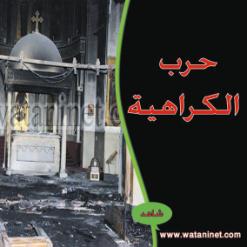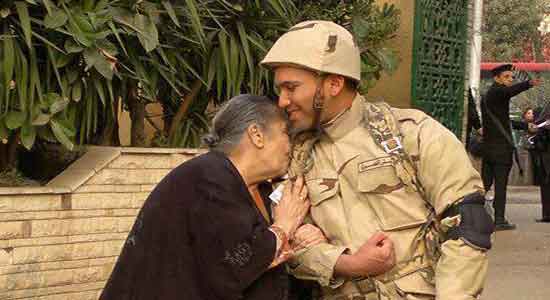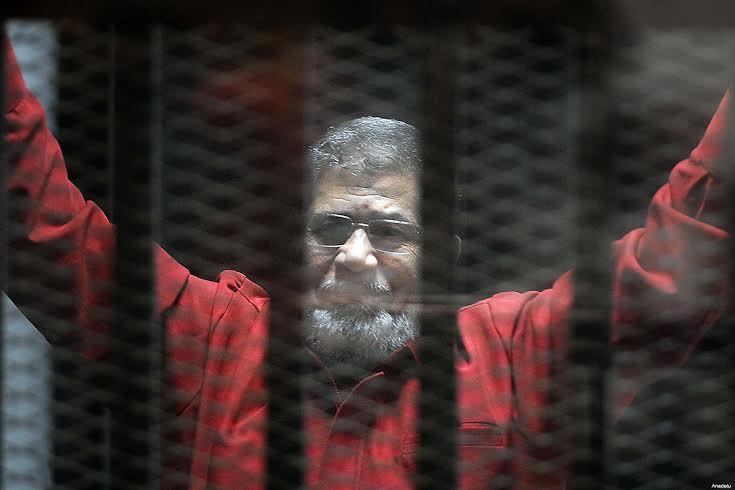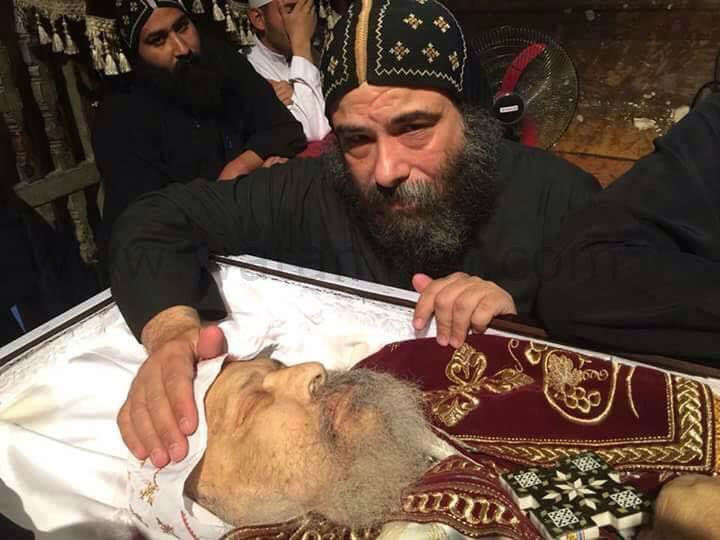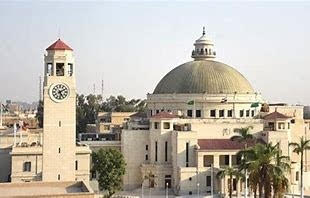Wataninet documents the Islamist rampage against the Copts on 14 August 2013
No one ever thought that Egypt’s overthrow of the Islamist MB-led regime would come without a price. The Islamists would never give up without a fight; there was a price to pay, and Egyptians knew they had to pay it if ever they were to build a modern, democratic Egypt. After all, where and when in the modern world did Islamists gain power then peacefully relinquish it? One need only glance at Iran, Afghanistan, Pakistan, Somalia, or Sudan to realise that Islamists just don’t give up power, no matter what it takes. Even Turkey which is so widely touted as a modern Islamic alternative is swiftly moving towards a State where secular currents are increasingly coming under constraint.
So the more-than-30 million Egyptians who went out on 30 June to dislodge the Islamist regime which had made a mockery of the democracy Egypt was seeking knew they were up against a daunting task, a task which might have failed altogether had the army not backed the people.
On 3 July, the Islamists were finally overthrown, and directly it was pay time. The Islamists retaliated by unleashing a torrent of terrorism of which they made no secret; their leaders explicitly said they would “burn Egypt” and show Egyptians “terror they never imagined existed”.
Christian revolutionists?!
Predictably, the worst terror was reserved for the Copts and they were the first targeted. Given that they have historically been a peaceful community which never answered violence with counter violence, and that Islamists had over the years built up among their support base so much hatred for the Copts whom they always branded as enemies of Islam, they were the easy prey. They were penalised for having dared to take an active part in the 30 June Revolution, as though it were not one of the basic rights of the Copts—as of other Egyptian citizens—to protest peacefully against conditions they rejected. Yet the Islamist slogan went: “Oh what indignity, what disgrace! The Nassaara (a derogatory term used to denote Christians) are revolutionists!”
The early hours of Wednesday 14 August saw the security forces break up the six-week long Islamist sit-ins in Cairo, which had become a scourge for Cairenes who had to sustain the horrendous armed violence spearheaded from their day in day out.
Ruin
The avalanche of consuming hate and violence unleashed against the Copts on 14 August eclipsed anything that had preceded it. The prime scene of events was Upper Egypt, a stronghold of Islamists and furthermore a place where clan and family loyalties reign supreme—meaning that it is easy to mobilise crowds to do whatever the elders or leaders of the clan command. From Sohag some 460kms south of Cairo; through Assiut, 350kms south; to Minya, 250km south; Beni Sweif, 100km south; Fayoum, 100 southwest Cairo; and Giza a few kilometres south of Cairo; a systematic rampage was waged against the Copts. Apart from Upper Egypt, Suez and Arish in North Sinai were also the scenes of attacks against Copts. Seven Copts lost their lives, killed in horrifying scenes. The bodies of two of them were beheaded and paraded all over the town of Dalga, Minya. Some 100 churches and Coptic establishments—including Church-owned community centres, schools, clinics, two Nile boats, and even an orphanage—were subjected to various degrees of destruction; 40 per cent of them were almost completely burnt and are a total loss, and the other 60 per cent have suffered damage. An appalling 1000 Coptic-owned homes, shops, private businesses, trucks, private cars, and motorcycles were destroyed.
Systemised attack
Wataninet has documented the 14 August rampage in a file under the title “The War of Hate”. It was the work of Watani reporters and correspondents Nader Shukry, Tereza Hanna, Basma William, Girgis Waheeb, Ra’fat Edward, and Jimmy Gaballah. “The War of Hate” was compiled and edited by Robeir al-Faris and Maged Samir; the video compilation and editing by Nasser Sobhy, and the final administrative and uploading effort by Mina Anwar and Mina Nagy. The work was directed and supervised by Dina Sidhom.
The “War of Hate” begins with a preface that introduces the reader to the backdrop of the events. The work is then divided into sections, each concerned with one province or region and including a tally of the losses, eyewitness reports, interviews with the bishops of the parishes that were hit, and a wealth of photographs and videos.
It is conspicuous that the bishops interviewed by Watani: the Coptic Orthodox bishops Anba Demetrius of Mallawi, Anba Agapius of Deir Muwwas, Anba Macarius of Minya, Anba Lucas of Abnoub; and the Coptic Catholic bishop of Minya Anba Boutros Fahim all said that the attacks by the Islamists were systematic and followed the same pattern everywhere, meaning they had been planned beforehand.
“The attack in itself came as no surprise,” said Anba Macarius, Bishop-General of Minya. “Ever since Mursi’s Islamist regime fell on 3 July, the local Islamists have been inciting against the Copts, and the MB leaders threatened to attack them [in defence of Islam] should the Islamist sit-ins in Cairo be disbanded. The surprise was in the systemised assault against the churches—Orthodox, Catholic, and Evangelical—and the homes and private and Church-owned establishments all at the same time.”
“We got our orders”
Eyewitnesses told Watani that, once news got around early on that fateful Wednesday 14 August that the security forces were breaking up the Islamist sit-ins, thousands of local Islamists—in Dalga, Minya, the estimate was that they were some 10,000—gathered and went on a rampage that began with attacking police stations, obviously to incapacitate the police and render the towns and villages indefensible. They attacked and burned public buildings, among them the courthouse in Mallawi, Minya and the Mallawi Museum; the Giza governorate building; the Ministry of Finance in Cairo; and many others; at the same time they turned their attention to the Copts. They began with the churches and Church-owned establishments like community centres, clinics, and schools; then went on to the homes, shops, businesses, even vehicles belonging to Copts.
Again the brutal pattern of attack was the same everywhere. First came the stone-throwing and the attempt to storm their way into the locked gates of the churches, homes, or other buildings. Once they made their way in, they threatened or attacked anyone inside who had not fled, or was not able to flee. Shouting obscenities against Christians, they looted everything inside. And by ‘everything’ we mean everything. Furniture, church pews, electric appliances, computers, school desks, cash and gold jewellery in homes were robbed and taken out. What could not be stolen was smashed; “the bathroom sinks and toilets, the wooden and ceramic flooring, even the electric wiring was grabbed out,” Father Julius of the church of St Michael in Kirdassa, Giza, told Watani.
A Kirdassa resident, a young technician whose first name is Ghali, told Watani that the village had always been a stronghold of Islamists, but that neighbourliness had always been honoured. The day the Islamists burned St Michael’s, Ghali says, his Islamist neighbour who had taken part in the assault came back to him and said: “Ghali, please don’t be cross at me. We got our orders.”
Vegetable market in place of ancient church
In case of churches or church establishment, the ritual was to bring down the cross which usually stands on top of the dome, building, or gate. Amid screams of “Allahu Akbar” (Allah is the greatest), someone climbs and belts the cross with ropes which the mob below tug until they pull it down. Then they proceed to smash it while rejoicing in their triumph. Finally—or in many cases in parallel with the plundering, they set the place on fire using gas cylinders, Molotovs, or some highly inflammable material. Predictably, there is no-one to put the fire out, the Islamists took care of that when they first attacked the police. No fire truck would have dared navigate the streets with so much unrest and no police in sight.
Among the irreparable losses has been the church of the Holy Virgin in Dalga, Minya, a fourth century church which was burnt down and forever lost. The following day, the Islamist mob brought in trucks and removed the rubble, then began digging, hoping to find treasure. When they didn’t, they turned the place into a vegetable market, and hung a sign saying: “Donations required to build a mosque here”. This went on for several days till word got out and the town elders, disgraced by the scandal, were able to persuade the Islamists to give the church site back to the Church.

Terrorising children
Muslim prayers were also held in several other sites where churches had been demolished. Following the crackdown against the Islamists by the security authorities, however, most of these sites were returned to the Church.
For Anba Macarius, however, all this pales before the attack against an orphanage in Minya. “This place housed children who had lost fathers and mothers,” he said. “Who could have had the heart to rob them of the place they now called home? And even if this ‘home’ could be replaced, how can the terror they saw as they fled the fire and gunshot be ever wiped off their minds and hearts?”
“They stole my cheese”
It was the attacks on the homes and shops, however, that was especially heart-rending. As the fires and assault raged outside, the Copts typically retreated into the ‘safety’ of their homes, locked their doors or gates, and huddled inside. It didn’t take much time for the Islamists to finish off the churches and turn to the Copts in their homes. They broke into the houses, and if the residents had not managed to flee they were abused, injured or, in the two cases where the owners actually resisted them, they were beheaded.
In many cases the Copts fled the town altogether or, if they could not do that, took refuge in church or were hidden by relatives in safer neighbourhoods or by Muslim neighbours. In Minya, eyewitnesses heard the Islamists ask which of the homes or shops belonged to Copts and attacked only these. One home they entered was owned by the Muslim family of Ahmed Hussein, who were terrified when the Islamists broke in. The daughter, a young woman, screamed in terror that they were Muslims, only to hear the assailants shout back at her: “Then why do you live among the Nassaara”, before leaving.
Several Copts, in tears, described how they had to hurry their children out of their houses and then look on as their homes were looted before their eyes going up in flames before their eyes. One elderly woman who had taken refuge in a church gave a heart-breaking account in which she deplored the looting of her home. “They stole my cheese,” she lamented. The meagreness of her worldly possessions made the theft of her small stock of home-made cheese a huge loss.

Eternal beauty
In the district of Abu-Hilal in Minya, the plunder and burning of the church of Anba Moussa al-Aswad (St Moses the Black) was especially painful to the congregation. The church, which was constructed in 2004 and consecrated in 2007, was built with the savings and donations of the people who worshipped there. When Watani was there to document the losses, an old woman fondly called by the youngsters Umm Karam came out to meet us. She was weeping uncontrollably. “I live here next to the church,” she said. “We saved so hard and worked so hard to build it. And we were so happy to finally have our own church. Now just look at it! A burnt ruin.”
But the plunder and burning of Anba Moussa al-Aswad’s is not the end of the story. Starting the Friday the week following of the attack, Holy Mass was held there among the ruins. With the smell of the scorched walls and smoke still in the air, the congregation gathered with Anba Macarius to pray. “We were confirming that the Church is not a building. The Church is inside every one of us, clergy and laity; it is in our living hearts and souls.” That day, he said, Holy Mass was held not amid the beauty of a majestic, arched and domed construction; not among the wondrous icons or chandeliers; but in the living beauty of the Eucharist.
The words of Pope Tawadros II ring true: “The hand of evil destroys, burns, and kills; but the hand of the Lord preserves, strengthens, blesses and builds.”
For the full collection of photos and videos, the reader can visit http://www.wataninet.com/watani_Article_Details.aspx?A=45365.
WATANI International
25 September 2013


